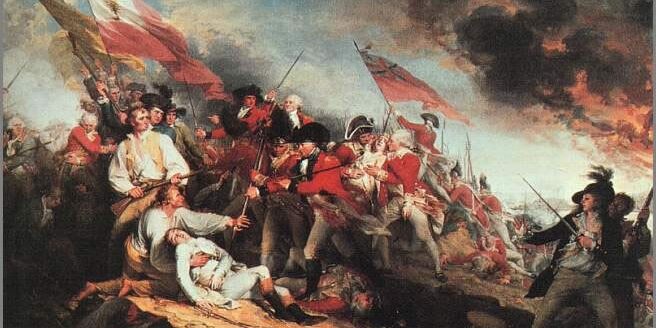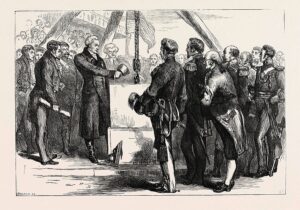 On June 17, 1825, at the 50th anniversary of the Battle of Bunker Hill, over 100,000 people (including 190 veterans of the actual battle) witnessed the Marquis de Lafayette, “America’s Guest” from France who fought with us for our independence, lay the cornerstone for the monument.
On June 17, 1825, at the 50th anniversary of the Battle of Bunker Hill, over 100,000 people (including 190 veterans of the actual battle) witnessed the Marquis de Lafayette, “America’s Guest” from France who fought with us for our independence, lay the cornerstone for the monument.
Daniel Webster, master of ceremonies, closed by saying; “Let the sacred obligations which have devolved on this generation, and on us, sink deep into our hearts…. The great trust now descends to new hands… by the blessing of God, may [our] country itself become a vast and splendid Monument, not of oppression and terror, but of Wisdom, of Peace, and of Liberty, upon which the world may gaze, with admiration, forever!”
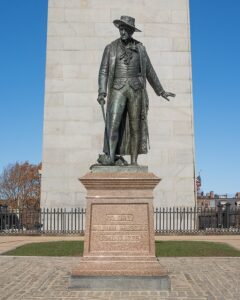 Two key leaders emulated Webster’s words. Two prominent statues are at the Bunker Hill Monument. The first is of Col. William Prescott (1726-1795). He served in the militia during King George’s War in the 1745 siege of Louisbourg, as well as lieutenant in the Provincial troops to remove the French from Nova Scotia in 1755. He was honored for his leadership of allied forces in the Battle of Fort Beausejour. He then returned home to manage his farm with his wife in Pepperell.
Two key leaders emulated Webster’s words. Two prominent statues are at the Bunker Hill Monument. The first is of Col. William Prescott (1726-1795). He served in the militia during King George’s War in the 1745 siege of Louisbourg, as well as lieutenant in the Provincial troops to remove the French from Nova Scotia in 1755. He was honored for his leadership of allied forces in the Battle of Fort Beausejour. He then returned home to manage his farm with his wife in Pepperell.
He became colonel of a regiment of minutemen (where he had served since 17 years of age) in his hometown. Arriving too late to participate in the Battle of Concord or the retreat of the British soldiers on April 19, he became part of the army under Washington laying siege to the British in Boston.
As a Pepperell town official, he sent a letter to Bostonians in 1774 opposing the Boston Port Act as well as the British Coercive Acts. In part he wrote, “Is not a glorious death in defense of our liberties better than a short, infamous life?” On the night of June 16, 1775, he led over a thousand militiamen to fortify Bunker Hill. He, along with Putnam and Gridley, decided to build the redoubt on the smaller Breed’s Hill, closer to Boston. To encourage his men, Prescott walked confidently on the redoubt as cannon balls were coming from four different British ships. He most likely gave the command “not to fire until you see the whites of their eyes.” By having all the militiamen fire at the same time close to the British, they inflicted twice the casualties on the regulars in three assaults: 1,054, compared to their 441.
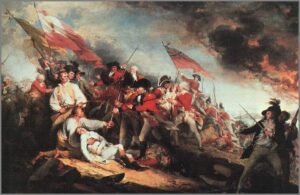 Prescott’s convictions in life enhanced his heroism in war. He never owned slaves and spoke out against the practice continually. In 1783, when Massachusetts abolished slavery, he celebrated the occasion. In addition, he commended African American soldier Peter Salem’s conduct during the battle, writing a letter to the General Court of Massachusetts to honor him. (Salem was the one who killed Major Pitcairn, allowing the militia to retreat, as demonstrated in Trumbull’s famous painting of the battle.)
Prescott’s convictions in life enhanced his heroism in war. He never owned slaves and spoke out against the practice continually. In 1783, when Massachusetts abolished slavery, he celebrated the occasion. In addition, he commended African American soldier Peter Salem’s conduct during the battle, writing a letter to the General Court of Massachusetts to honor him. (Salem was the one who killed Major Pitcairn, allowing the militia to retreat, as demonstrated in Trumbull’s famous painting of the battle.)
The central figure dying in Trumbull’s painting is General Joseph Warren. When British General Thomas Gage learned that Warren had died, he declared he was worth 500 men. The British then stabbed his body beyond recognition and threw him in a common grave, but Paul Revere was able to identify him due to the false teeth he had given him. Why was Warren such a threat to the British? With no military experience, he had been commissioned as a major general in the Massachusetts Militia, but insisted he fight as a private. He stayed in the redoubt, where the most intense fighting was, to allow others to retreat safely. James Warren wrote to his wife, Mercy Otis Warren (both from Plymouth), that “our inexpressible Grief is [the death of] my Friend Doctor Joseph Warren who was killed.”
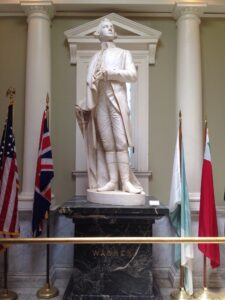 But it was not the sacrificial way Warren died that prompted the British to fear him. It was the way he lived, and the Christian convictions he held and expressed that undergirded the patriot cause that terrified the enemies of freedom. As a physician, Warren had saved 7-year-old John Quincy Adams’ finger from amputation, serving as the Adams’ family doctor. He also ministered to Loyalist patients such as Tory Governor Thomas Hutchinson and British General Gage and his wife Margaret. It is his statue that is the second prominent one at Bunker Hill.
But it was not the sacrificial way Warren died that prompted the British to fear him. It was the way he lived, and the Christian convictions he held and expressed that undergirded the patriot cause that terrified the enemies of freedom. As a physician, Warren had saved 7-year-old John Quincy Adams’ finger from amputation, serving as the Adams’ family doctor. He also ministered to Loyalist patients such as Tory Governor Thomas Hutchinson and British General Gage and his wife Margaret. It is his statue that is the second prominent one at Bunker Hill.
A Son of Liberty, working with Sam Adams, John Hancock, and Paul Revere, Warren had been appointed to the Boston Committee of Correspondence. Authoring the Suffolk Resolves, published September 9, 1774, this was officially endorsed by the Continental Congress as well. The second article stated: “That it is an indispensable duty which we owe to God, our country, ourselves and posterity, by all lawful ways and means in our power to maintain, defend and preserve those civil and religious rights and liberties, for which many of our fathers fought, bled and died, and to hand them down to entire future generations.”
Warren delivered two orations at the Old South Church in commemoration of the Boston Massacre, the second of which was on March 6, 1775 while the British occupied the town (three months before he died):
“You then, who nobly have espoused your country’s cause, who generously have sacrificed wealth and ease; who had despised the pomp and show of tinseled greatness; refused the summons to the festive board; been deaf to the alluring calls of luxury and mirth; who have forsaken the downy pillow to keep your vigils by the midnight lamp, for the salvation of your invaded county… drop the mantle to some young Elisha, and take your seats with kindred spirits….”
When Daniel Webster gave the dedication address at the Bunker Hill Monument on its completion, June 17, 1843, he declared, “Let us feel our personal responsibility, to the full extent of our power and influence, for the preservation of the principles of civil and religious liberty. And let us remember that it is only religion, and morals, and knowledge, that can make men respectable and happy, under any form of government.” These sentiments were embodied in the life of Joseph Warren.
But perhaps the greatest legacy of Joseph Warren was his devotion to future generations, desiring little recognition or position in this life. Only a few days before the Battle of Lexington, he, along with Sam Adams and John Hancock, sat with Pastor Jonas Clarke in his parsonage at Lexington. Though several had warned Warren of the danger of returning to Boston, Pastor Clarke gave him an exhortation: “As I lay on my bed last night, I prayerfully considered what words I might offer you… Psalm 126 came to mind… they that sow in tears shall reap in joy….”
Joseph responded that due to possible war and death, “We will not be doing any reaping in this life, but perhaps our children will reap what we have sown.” Jonas Clarke replied, “Our children will, and I trust the joy awaiting those who shed their blood will be greater than our finite minds can imagine!”

